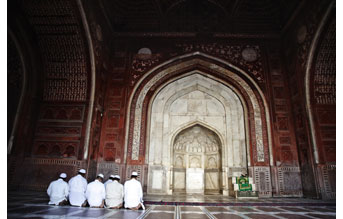Two words

He had never prayed two rak`ah (units of prayer) in his adult life. Born and raised in Egypt, he had continuously heard the athan (call to prayer) and the iqama (second call to prayer) rolling through the streets, calling the believers to prayer, but he had never voluntarily accepted the call. This included refusing to pray at the masjid (mosque) on the first floor of the apartment building in which he lived; He passed by it day and night, on his way to work, on his way to spend hours at the local Hookah Café with his friends, and on his way home to his wife and children, only to start the routine of neglecting his prayers again the following day.
On one Friday, he was suddenly hit by a novel idea. “Why don’t I just try Friday prayer today? Just to see what it’s like? I’ll just try it,” the man thought. He came in late to the masjid; The Khatib(speaker) was already speaking. As the man was looking for a place to sit, he heard the words of the Khatib, “The Prophet ﷺ (peace be upon him) has told us:
كلمتان خفيفتان على اللسان ، ثقيلتان في الميزان، حبيبتان إلى الرحمن: سبحان الله وبحمده، سبحان الله العظيم
“Two words are light on the tongue, heavy in the balance, beloved to the Merciful: ‘Glory be to Allah and by His praise. Glory be to Allah, the Immense.’” (Bukhari)
The man, preoccupied with having just entered and finding a place to sit, only heard a few of the Khatib’s words. He sat, perplexed, turning the fragmented words over and over in his mind, “Kalimatan (two words)… habibatan (both beloved)… ila-Rahman (to The Merciful)… Subhan Allahi wa bihamdi (Glory be to Allah and by His praise)… Subhan Allah il-`atheem (Glory be to Allah, the Immense).” He had lost complete focus on the rest of the khutbah (sermon), overtaken by these words he had heard in passing, working hard to make sense of what the words could possibly mean.
After the prayer, he approached the Khatib directly. “Is all what you’ve said in the khutbah today true?” he questioned. Surprised, the Khatib responded, “I’ve said quite a bit in the khutbah today. To what specifically are you referring?” The man replied, “You said some words… Kalimatan… habibatan… ila–Rahman… Subhan Allahi wa bi hamdih, subhan Allah il-`atheem.”
The Khatib smiled in recognition. “Yes, those are in fact from a blessed hadith (narration) from The Truthful himself ﷺ. He told us:
كلمتان خفيفتان على اللسان ، ثقيلتان في الميزان، حبيبتان إلى الرحمن: سبحان الله وبحمده، سبحان الله العظيم
“Two words are light on the tongue, heavy in the balance, beloved to the Merciful: ‘Glory be to Allah and by His praise. Glory be to Allah, the Immense.’” (Bukhari)
The man stood, overwhelmed, awestruck, in a daze. The words had penetrated through his heart and embraced his soul. Captivated, he continued to repeat the hadith of the Prophet ﷺ over and over to himself:
كلمتان خفيفتان على اللسان ، ثقيلتان في الميزان، حبيبتان إلى الرحمن: سبحان الله وبحمده، سبحان الله العظيم
“Two words are light on the tongue, heavy in the balance, beloved to the Merciful: ‘Glory be to Allah and by His praise. Glory be to Allah, the Immense.’”
He walked out of the masjid in a trance and left for his home. Upon entering, he gathered his wife and children. “Have you heard,” he began to tell them, “the words of the Prophet ﷺ? He has told us:
كلمتان خفيفتان على اللسان ، ثقيلتان في الميزان، حبيبتان إلى الرحمن: سبحان الله وبحمده، سبحان الله العظيم
“Two words are light on the tongue, heavy in the balance, beloved to the Merciful: ‘Glory be to Allah and by His praise. Glory be to Allah, the Immense.’”
From that moment, the man transformed. From his home, he would leave to work, from his work, he would go straight to the Masjid, and from the Masjid, he would immediately go back home to his wife and children. All the while, two words kept his lips moving and his tongue wet with remembrance, “Subhan Allahi wa bihamdi, Subhan Allah il-`atheem.”
Soon, his friends from the Hookah Café noticed his continued absence. They came to his apartment one day. “Where have you been?” they asked. “We haven’t seen you smokin’ hookah with us for a while.”
A beautiful, wistful look came over the man’s face. “Haven’t you heard?” He replied to his old crew from the café, “The Prophet ﷺ has told us:
كلمتان خفيفتان على اللسان ، ثقيلتان في الميزان، حبيبتان إلى الرحمن: سبحان الله وبحمده، سبحان الله العظيم
“Two words are light on the tongue, heavy in the balance, beloved to the Merciful: ‘Glory be to Allah and by His praise. Glory be to Allah, the Immense.’”
And this is how he spent his days; reminding his family, his friends, those in the masjid and those who passed by in the streets, about the beloved words to Allah, those heavy words on the scale, those words light on the tongue, “Subhan Allahi wa bihamdi, subhan Allah il-`atheem.” The man had gone from a person who never prayed, spent little time with family and frequented the house of hookah instead of the House of Allah subhanahu wa ta`ala (exalted is He), to a person who longed for Allah (swt), whose eyes were filled with tears, whose tongue, heart, and soul burned with the inscription:
كلمتان خفيفتان على اللسان ، ثقيلتان في الميزان، حبيبتان إلى الرحمن: سبحان الله وبحمده، سبحان الله العظيم
“Two words are light on the tongue, heavy in the balance, beloved to the Merciful: ‘Glory be to Allah and by His praise. Glory be to Allah, the Immense.’”
Soon, he fell ill. It had only been a few months since he had gone to the masjid, since he had first heard the beloved words of the Prophet ﷺ by the Khatib in a Jumu`ah (Friday) khutbah. He told his son to go and to ask the Masjid administration to call upon that very Khatib to come visit him in his illness.
When he was informed, the Khatib remembered the man immediately and rushed to his apartment. Upon being let in, he saw the man, sleeping in his bed, the doctor sitting at his side. The Khatib sat at the foot of the bed and waited for the man to awaken. Finally, the man stirred and he noticed, at the foot of his bed, the very Khatib who had related the beloved, noble words of the Prophet ﷺ.
The man looked at the Khatib. He then asked him, “Have you heard? The Prophet ﷺ has told us:
كلمتان خفيفتان على اللسان ، ثقيلتان في الميزان، حبيبتان إلى الرحمن: سبحان الله وبحمده، سبحان الله العظيم
“Two words are light on the tongue, heavy in the balance, beloved to the Merciful: ‘Glory be to Allah and by His praise. Glory be to Allah, the Immense.’”
With that, the man passed away.
The Khatib in this story is the teacher of my Arabic teacher. My Arabic teacher related this incident to me and continued to stress that it wasn’t a story from books of the past, it wasn’t a story coined to tug hearts, it was the true story of a man who was completely disconnected from Allah (swt), but to whom Allah (swt) gave a passing thought to enter the masjid, and who Allah (swt) blessed with hearing the words of the Prophet ﷺ at a time and in a way which truly impacted his soul and final actions in life.
My teacher then told me, “The Prophet ﷺ has said: ‘Convey from me, even if it’s just one ayah[verse]…’” (Bukhari).
We never know what word or action, done with a sincere intention, will truly be a means of impacting another person’s life to come back to Allah (swt).
Let’s stop judging people; let’s stop driving people out of mosques because “we” deem their dress, their swagger, their accessories, or language as something “unsuitable” to the House of God. Let’s stop assuming they’ll never be guided to “our righteous path” (since we’re so righteous, we guided our own selves, right?) and thus resolve to harsh words or disapproving stares. Perhaps those who “we” think are far from Allah (swt) will pass in a more honorable, beloved state to the One Who guides.
Let us be the first to cling to the beloved words to Allah (swt), “Subhan Allahi wa bihamdih, subhan Allah il-`atheem,” and let us warmly, sincerely and smile-fully be a means of helping ourselves and others come back to Allah (swt)—with His Power and Mercy—through relating the beautiful words of Allah (swt) and His Prophet ﷺ, through action and speech. We never know what small, miniscule act, may be a means of guidance for ourselves and another, and a means of possibly entering jannatul firdose al `alaa bi ghayri hisaab—The Highest Paradise, without any reckoning.
May Allah (swt) bless this man’s soul. Subhan Allah—if he had died like any other person who knows about the obligation of prayer and lazily defies praying, we would never know his story—he’d just be another person who passed away in another country, a person we may have never even known existed..
But perhaps because of his repentance and his sincere coming back to Allah (swt), Allah has blessed us with coming to know of him—so that his actions will continue to be rewarded even while he’s in his grave, every single time any one of us, because of his story, even across the world, remember to say, “Subhan Allahi wa bihamdi, subhan Allah il-`atheem.”
What will you do—so sincerely—that Allah (swt) will bless people with being transformed because of you, even after you’ve passed on?
Proudly brought to you by Virtual Mosque, more Virtual Mosque can be found at http://www.virtualmosque.com/ummah/community/two-words/
Since You’re Here… we have a small favour to ask.
In these extraordinary times, millions rely on HOTD for daily uplifting & inspiring content. Established since 2009 and with your kind support we’ve seen readers elevate their Imaan & strive for better on a daily basis. We’re committed to keeping our content freely available and open for all readers. Every contribution, however big or small, makes a difference and help us spread knowledge to millions daily
HOTD is something special, it’s a place where people can come to be inspired, to renew their faith, to learn and share knowledge, to fall in love with our faith and also our Prophet (peace and blessings be upon him and his family).
All content on HOTD is free. We believe what we do in this life builds for the next one and we work tirelessly with the aim to please Allah and inspire the global Muslim community as
well as providing information and inspiration for anyone interested in Islam. We simply cannot do this without your support and your support helps us continue our services.
If there were ever a time to join us, it is now. You can support HOTD and help sustain our future. Support Hadith of the Day and make a one-off donation or give regularly from as little as £10 a month Jazak’Allah Khayr – whatever you donate will come back to benefit you Insha’Allah as whatever is spent in the way of Allah is an investment in the future and the next life. Thank you.







